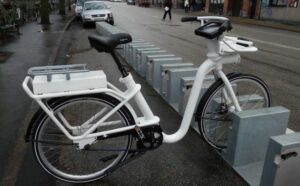News
City bikes handed last chance to succeed
This article is more than 10 years old.
GoBike has pledged to have all 1,860 bikes in place by October 15

There are currently only 424 city bikes on the streets of Copenhagen and Frederiksberg (photo: Commando Foote)
Less than a month after Copenhagen’s electric-driven GoBike city bike program was blasted as an expensive failure doomed to fold, the foundation behind the initiative By- og Pendlercykelfonden has been given the green light for it to continue.
The news comes as the distributor of the city bikes, GoBike Danmark, guaranteed to deliver all of the 1,860 promised bikes over the course of this summer and autumn.
“We are sorry about the delay, but we look forward to welcoming citizens and visitors to Copenhagen and Frederiksberg to a well-functioning bicycle system over the summer and early autumn,” said Nikolaj Bøgh, the chairman of By- og Pendlercykelfonden.
After the remaining bikes have been delivered, GoBike will then be responsible for maintaining the system for the next eight years.
READ MORE: Copenhagen’s city bikes an expensive failure
Last chance saloon
There are currently 424 city bikes on the streets of Copenhagen and Frederiksberg – a number that is expected to increase to 1,000 by July 15. The total will reach 1,400 by September 1, and 1,860 by October 15.
Should GoBike be unable to adhere to the plan, By- og Pendlercykelfonden will annul the contract, which has already cost the municipalities in Frederiksberg and Copenhagen, along with national rail operator DSB, in excess of 16 million kroner.
The three have also agreed to invest 88 million kroner into the project over the next eight years.
GoBike was originally expected to have delivered all of the city bikes by April 1.










































